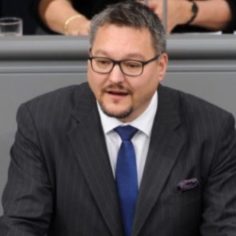Turkish agents in Germany ‘a ticking time bomb’
Is Turkey spying on Germany? Does Ankara support Turkish extremists in Germany? Stefan Keuter, deputy in the Bundestag for the Eurosceptic AfD party, recently wanted to know exactly what was going on between the two countries. He has received rather disturbing answers from Berlin.
Published: September 14, 2020, 1:36 pm
Mr. Keuter, you recently submitted an inquiry to the German government in which you asked about the influence of Turkish secret services in Germany and the EU. Is this topic really that important?
Keuter: I would say even more than that. This question was prompted by media reports in July that four soldiers of Turkish origin in the German Army were suspected of being members of the extremist organization “Grey Wolves”. And even more than that: there are also allegedly connections to the Turkish secret service. I consider such events to be highly dangerous for our country. To be honest, I am surprised that neither members of the CDU/CSU nor of the FDP came up with the idea to ask about this. And I have to say that the answers of the German government are both very informative and disappointing.
What do you mean by that?
Keuter: On the one hand, it is downright scandalous how much the Turkish foreign secret service has been active here to gain access to our country, and at the same time it is disappointing how meekly Berlin has been reacting to this threat.
For example?
Keuter: The German government makes no secret of the threat in its response. It writes: “For Turkey, Germany remains one of the primary intelligence research targets abroad. The responsible Turkish domestic and foreign intelligence service Millî İstihbarat Teşkilâtı (MIT) is a central element of the Turkish security architecture. It serves the Turkish government under the President Erdogan and his “Party for Justice and Upswing” (AKP) to implement government policy, maintain internal security and, last but not least, to gather information that prepares political decisions.
That is hardly a clearer description of intelligence attacks against Germany…
Keuter: That is the way it is. So, we know what is happening. But how is Berlin responding?
How?
Keuter: In its answer to our question about the consequences, the German government writes that Turkish espionage has “repeatedly been the subject of bilateral talks between the German government and representatives of Turkish government”. In doing so, the German government “pointed out that it would not be acceptable for Turkish domestic conflicts to enter German society”.
In addition, Turkey remains “an important strategic partner for Germany, also in NATO”. Furthermore: Ankara continues to receive money from Germany, according to the German government in the “field of refugees and migration”. The aim of this funding is “to integrate refugees into Turkish society and the labor market, to strengthen host communities and to reduce social tensions”. Forgive me – that is absurd.
Today even the mainstream press knows that in Syrian refugee camps in Turkey, militiamen are regularly recruited for the war in Syria. Moreover, Turkey has been using Syrian refugees from the very beginning as a kind of weapon of migration against the EU.
One wonders: How will Ankara be able to interpret these answers differently than a complete carte blanche for intelligence activities directed against Germany? We are spied on, and then in response, we have amicable discussions while at the same time guaranteeing good relations. No wonder that the Turkish president Recep Tayyip Erdogan obviously does not respect us.
Back to the four Turkish Bundeswehr soldiers suspected by the secret service. Your inquiry brought to light that one of the four had been on a foreign mission in Afghanistan. Why is this a problem?
Keuter: I think the word “problem” is inappropriate. I see it as a serious security topic. In such a case, it is no longer simply a matter of passing on a few pieces of information, but of endangering the security of the German soldiers stationed there. In the already more than questionable Afghanistan mission of the Bundeswehr, this suddenly brings an additional risk component. Just imagine an agent within the German troops passing on strategic and tactical information to a foreign service, which in turn hands it over to Islamist militias – our enemies…
Another important point in your small inquiry is the support of Turkish extremists in Germany by Ankara…
Keuter: Here it concerns the so-called “Ülkücü” movement active in Germany, which is assigned to the “Grey Wolves”. In other words, it is about Turkish right-wing extremists in Germany. According to the German government’s answer, the “Ülkücü” movement includes 11 000 members in Germany. In the answer, the German government says: “The state representatives of Turkey have treated the Ülkücü supporters in Germany with goodwill. The Turkish government policy, in turn, also finds predominant support in the German Ülkücü scene and among Turkish nationalists”.
So, while Berlin, in its fight against your party, the AfD, declares every patriot a “neo-Nazi” and “fascist”, at the same time, does it tolerate that Turkey cultivates and maintains a right-wing extremist organisation on German soil?
Keuter: One must interpret it exactly like that. Or more succinctly put: One cannot interpret it any other way. With Ankara we are dealing with a “partner” who maintains and promotes a kind of “militia” in Germany, under the eyes of our own government, from whom relatives receive military training from us as Bundeswehr soldiers. It must be clear to all of us that whoever is a member of the “Grey Wolves” clearly represents the interests of Turkey and not those of Germany.
And today’s Turkey under Erdogan is pursuing a megalomaniac, neo-Ottoman project that threatens peace with an aggressive foreign policy – whether in Syria, in Libya or, as is currently the case, with its neighbour Greece.
This is a ticking time bomb! Erdogan could mobilize his people in Germany at any time. We are talking here about a considerable potential for blackmail, which Ankara now has at its disposal. This problem cannot be solved by “conversation therapy” or diplomatic talk shops, but only by hard diplomatic and economic consequences.
All rights reserved. You have permission to quote freely from the articles provided that the source (www.freewestmedia.com) is given. Photos may not be used without our consent.
Consider donating to support our work
Help us to produce more articles like this. FreeWestMedia is depending on donations from our readers to keep going. With your help, we expose the mainstream fake news agenda.
Keep your language polite. Readers from many different countries visit and contribute to Free West Media and we must therefore obey the rules in, for example, Germany. Illegal content will be deleted.
If you have been approved to post comments without preview from FWM, you are responsible for violations of any law. This means that FWM may be forced to cooperate with authorities in a possible crime investigation.
If your comments are subject to preview by FWM, please be patient. We continually review comments but depending on the time of day it can take up to several hours before your comment is reviewed.
We reserve the right to delete comments that are offensive, contain slander or foul language, or are irrelevant to the discussion.

Swedish military wants to remilitarize the Åland Islands
The demilitarized autonomy has previously been known as 'the islands of peace.

NOAA Predicts Zero Sunspots for Almost the Whole 2030s
CLIMATEThe United States' government scientific organization, the National Oceanic and Atmospheric Administration (NOAA), predicts zero sunspots from 2031 to 2040. This is an extreme situation that has not occurred in as long as humanity has been counting sunspots, and it leads us into uncharted territory in terms of our solar system. However, this prediction aligns with the warnings of the world-renowned solar researcher Valentina Zharkova for many years, who indicated in 2019 various signs of this catastrophic phenomenon, including the extreme hailstorms we have seen in Europe and the world this summer. The forecast and various observations this year give cause for very significant concern. In this unique analysis, Free West Media explains why.

European Nationalist Parties Forge Cooperation Ahead of EU Elections
EUROPEAN ELECTIONSOn Saturday, August 26, representatives of six European nationalist parties gathered in Budapest. The meeting was initiated by the Hungarian party Mi Hazánk and took place in the national parliament. Representatives of the parties signed a joint declaration that not only reaffirms the parties' friendship but also their unity on a range of complex political issues. A surprisingly clear and radical manifesto was established. The hope is that this cooperation will lead to success in the EU elections and eventually result in the formation of a group in the European Parliament. For Swedish nationalism, this meeting marks a success as Sweden, for the first time, has a party represented in a leading nationalist cooperation in Europe. Free West Media was present at this historic event.

Turkey Believes Sweden Hasn’t Done Enough
Sweden will have to wait a bit longer for NATO membership, according to Turkey's Justice Minister Jilmaz Tunc. First, Sweden must extradite the "terrorists" Turkey wants and stop the desecration of the Quran.

Swedish Weapon Takes Down Russia’s Best Attack Helicopter
The Russian attack helicopter Ka-52 is considered one of the world's best and has struck fear in Ukraine, where it has hunted down tanks and other armored vehicles, often beyond the range of many light anti-aircraft systems. However, it has met its match in the Swedish air defense missile system RBS 70, which has quickly led to significant losses for the Russian helicopter forces.

Strong Confidence in German AfD
Alternative for Germany (AfD) held a party conference on July 29-30 to select candidates for the upcoming EU election next year. EU Parliament member Maximilian Krah, belonging to the party's more radical, ethnonationalist faction, was appointed as the top candidate. The party's two spokespersons delivered powerful speeches criticizing the EU's failed migration policy and trade sanctions that isolate Europe and Germany from the rest of the world. They argued that it's time for the EU to return a significant portion of its power to national parliaments. However, they have dropped the demand for Germany to exit the EU.

The Establishment Wants to Ban Germany’s Second Largest Party – for the Sake of Democracy
The rising popularity of AfD has raised strong concerns within the establishment. Despite lies and demonization in the media and isolation from the overall political establishment, the party continues to grow. Certain representatives of the party are accused of becoming increasingly "extreme," and in an unusual move, the influential weekly newspaper Der Spiegel demanded that AfD be "banned."

Dutch FvD break through the media blockade
What is happening in the Netherlands? It is often difficult to follow events in other countries, especially when distorted by system media. We give Forum for Democracy (FvD) the opportunity to speak out on the political situation in the Netherlands and the staunch resistance they face in trying to save the country.

The Ursula von der Leyen Affair
After a criminal complaint in Belgium against the President of the European Commission, the so-called SMS-case, now takes a new turn. The judge responsible for the investigation will likely gain access to the secret messages exchanged between Ursula von der Leyen and Albert Bourla, CEO of Pfizer, at least if they haven't been deleted.

Publisher of Unique Literature Worldwide Blocked by International Distributor
Arktos has distinguished itself by publishing groundbreaking philosophers and social critics. Now, the publisher's international distributor has abruptly terminated the cooperation, and more than 400 already printed titles cannot reach their audience. There is strong evidence that the distributor has been under pressure, something that has also happened in Sweden. We have spoken with Arktos founder Daniel Friberg about the ongoing struggle for freedom of speech in a shrinking cultural corridor.


